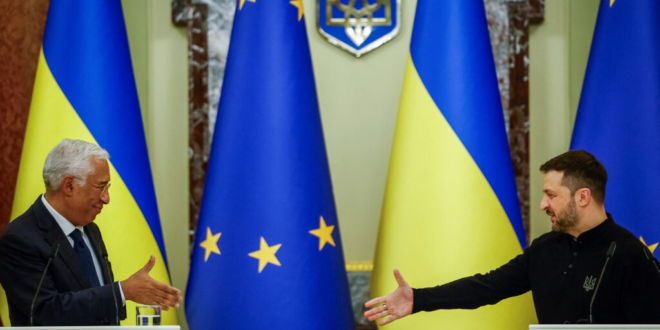The European Union urgently needs a Russia strategy. A strategy document that articulates a strong vision and comes with the proper policy tools and financial commitments would serve as a signal to the United States that Europe understands the threat posed by Putin’s Russia at a critical moment in the relationship between Washington, Brussels, and Moscow.
The impending Trump presidency will shape EU foreign policy and redefine transatlantic ties. A second Trump administration will surely demand more from Europe, including on issues such as Europe’s defense spending and its support for Ukraine. Even as defense budgets across Europe rise and the EU takes a more forward-leaning role on support for Ukraine, the goalposts Washington sets will move. This challenge could create positive opportunities for the EU if it produces a European strategy on Russia.
Currently, the bloc does not have a formal strategy toward Russia. This is inconsistent, as the EU has adopted official strategies for relations with a range of countries and regions including China, the Indo-Pacific, and Central Asia, with a strategy for the Middle East under development. But it’s more than inconsistent. Failure to draft a Russia strategy suggests a lack of seriousness and undermines the credibility of the bloc’s geopolitical ambitions.
The most serious obstacle to an EU Russia strategy has traditionally been the inability of member states to agree on interests and priorities. Countries closest to Russia and those with recent histories of oppression by Moscow have a more acute threat perception, whereas others in Europe often still see Russia as an essentially regional issue.
However, Russia’s challenge to Europe is clearly no longer regional. It quite literally surrounds and permeates the EU. Russia has unleashed the largest land war on the continent since World War II. To undercut sanctions, it has built up a “shadow fleet” of oil tankers that threaten to create a major environmental disaster in European waters. From the Western Balkans to the Sahel, Russia competes for influence, generates disinformation, and seeks to destabilize governments. Elsewhere in Africa, Moscow deploys mercenaries to support friendly governments and to secure access to resources.
Inside the EU, intelligence agencies say Putin is actively engaged in efforts to undermine the political stability of member states. Russia is accused of spreading disinformation, stirring up political conflict, and even resorting to acts of sabotage, such as the recent attempt to plant explosive devices on European airplanes flying to the United States.
Faced with increasing Russian threats and growing US demands, the EU needs a unified approach toward Moscow. In response, the new European Commission should prioritize the development of an EU Russia strategy aimed at creating a more forward-thinking, ambitious, and cohesive European approach.
This would have multiple benefits. First, it would provide a forum for EU members to jointly develop a vision for future policy toward Russia. Second, a strategy would allow the EU to draw a coherent picture of how Moscow’s various tactics are interlinked and threaten the entire bloc. Additionally, the EU would be better positioned for stronger enforcement. Articulating a longer-term Russia policy would lock in the hard-won gains of recent years, helping to ensure that countries like Germany do not return to problematic practices like relying on Russian energy.
The EU now has the right personnel in place to lead this effort. The new High Representative for Foreign Policy Kaja Kallas, an ardent Russia hawk, could push for an ambitious and forward-leaning posture toward Russia. Other senior officials including defense commissioner Andreas Kubilius could lend credibility to the strategy, which would naturally be prepared in close coordination with European Commission President Ursula von der Leyen, herself a strong supporter of Ukraine.
Any would-be Russia strategy must start with Ukraine. Support for Kyiv is the central element of Europe’s policy toward Russia, so a successful strategy must plot a path forward on key Ukraine-related issues including financial support, defense industrial cooperation, reconstruction, and eventual Ukrainian EU membership. Similarly, any strategy should also keep in mind areas like the Western Balkans, Moldova, and the South Caucasus, with a view to helping counter Russian influence.
Economic statecraft should be a key focus. The EU has gradually adopted a more ambitious sanctions policy toward Moscow, but enforcement is lacking. For example, the EU will need to develop a realistic plan to deal with Russia’s shadow fleet and to ensure that Russian energy isn’t entering the EU via backdoor routes.
In order to be effective, an EU Russia strategy must not fall victim to the tendency to water down or take an overly narrow view of the task at hand. Previous EU foreign policy documents, for example the Strategic Compass, offered a raft of initiatives and legislative projects but struggled to project a grander vision.
Drafting a Russia strategy will be a politically difficult but worthwhile endeavor. It will be challenging to achieve an EU strategy that is sufficiently ambitious and necessarily forward-leaning while maintaining support from all member states, especially as certain countries have a record of obstructing EU support for Ukraine.
Nevertheless, it would represent a crucial step toward addressing today’s changing realities. In addition to boosting the EU’s capacity as a geopolitical actor, a comprehensive and practical Russia strategy would signal to the United States that Europe is stepping up and would help strengthen transatlantic ties.
The incoming US administration should support the EU in developing its Russia strategy. An EU that is ready to lead efforts to counter Russia, both inside Europe and throughout the wider region, is exactly what the transatlantic relationship needs.
 Eurasia Press & News
Eurasia Press & News


